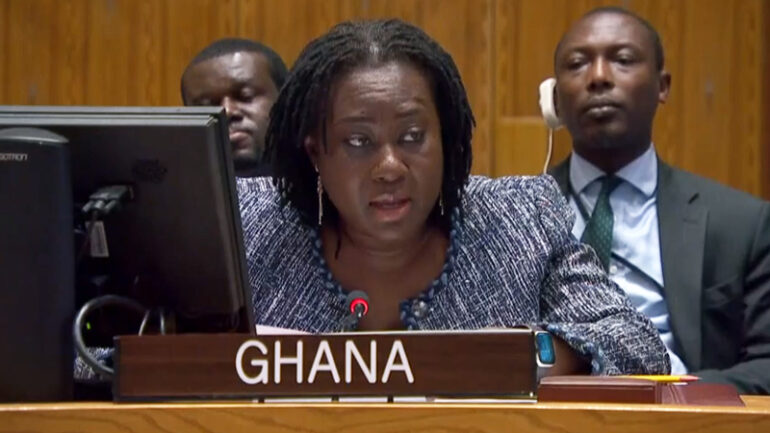UN Security Council Briefing on Maritime Security in the Gulf of Guinea

Carolyn Oppong-Ntiri (Mrs)
Deputy Permanent Representative
June 21, 2023
DURING THE SECURITY COUNCIL BRIEFING ON MARITIME SECURITY IN THE GULF OF GUINEA(GoG)
Madam. President,
I thank the UAE for convening this briefing on Maritime Security in the Gulf of Guinea. Ghana welcomes the statements by ASG Martha Pobee of the Department of Political and Peacebuilding Affairs and Peace Operations, His Excellency Mr.Gilberto da Piedade Verissimo, President of the ECCAS Commission, His Excellency Dr. Omar Alieu Touray, President of the ECOWAS Commission and His Excellency Mr. Jose Mba Abeso, Executive Secretary of the Gulf of Guinea Commission.
Madam President,
This year marks the 10th Anniversary of the Yaoundé Code of Conduct, and as we celebrate this milestone, we acknowledge the significant progress made by the region in tackling piracy and armed robbery in the Gulf of Guinea. The adoption of Security Council resolutions 2018 (2011) and 2039 (2012) laid the foundation for the adoption of the regional mechanism in 2013. While welcoming the decline in maritime insecurity in the region in recent times, we note that it did not happen by chance. This positive development can be attributed to a number of factors, including strong concerted action in strengthening cooperation among stakeholders at the national, regional and binternational levels, increased naval presence and sharing of intelligence and strengthened judicial processes that have led to the prosecution and conviction of pirates. These efforts need to be sustained. Despite the modest gains made, we note that the region is not out of the woods yet as we continue to witness vestiges of piracy, armed robbery, and illegal fishing in the region that threaten the maritime space. Other aggravating factors, including climate change and environmental degradation, are also of concern.
The decade-long existence of the regional mechanism provides us with an opportunity to reflect on what has been achieved so far and what needs to be done now and, in the future, to ensure the mechanism’s effectiveness. It is against this backdrop that Ghana believes the following actions need to be taken to help win the fight against the menace.
First, we need to prioritize the implementation of regional instruments designed to tackle maritime insecurity; second, we need to tackle the root causes of piracy and armed robbery at sea; third, adopt a whole-of-society approach that includes the private sector, local communities and CSOs’ participation, and fourth, we need to leverage partnerships. On the issue of regional mechanisms, it is important for Member States to renew their commitment to implementing the Yaoundé Code of Conduct since it is at the heart of dealing with the menace sustainably. We, however, note the operational, logistical, funding, technical and capacity building gaps hampering its implementation, and we welcome efforts to address them.
We also need to encourage Member States that are yet to enact legislation that criminalizes piracy to the full extent set out in UNCLOS to do so to help fight the menace. Regarding the root causes, these can be effectively addressed if we prioritize
non-security investments aimed at building resilience and resolving increasing levels of poverty, high unemployment, especially among the region’s youth, and other aggravating factors such as climate change and the disproportionate impact of Illegal, Unreported and Unregulated (IUU) fishing in the region. We should also embrace a multi-dimensional and whole-ofsociety approach, integrating gender perspectives into maritime security strategies and recognise the intervening role of the PBC in providing selfsustaining support in the areas of entrepreneurial skills and agricultural selfemployment, among others.
At the national level investing in research, capacity building, strengthened inter-agency collaboration, and media reportage on maritime security issues are all useful tools which could help to comprehensively deal with the issue. On partnerships, we share the view that in addition to regional mechanisms, we should leverage the tools available in the multilateral system and strengthen cooperation under continental initiatives such as the 2050 Africa Integrated Maritime Strategy (AIMS) with critical agencies in the UN family such as the UNODC, International Maritime Organization (IMO), and UNOCT. Enhanced cooperation should also include continued engagements with key stakeholders such as the European Union, the Group of Seven Group of Friends of the Gulf of Guinea (G7 ++ FoGG), and the Gulf of Guinea Maritime Collaboration Forum and Shared Awareness and De-confliction (GoG-MCF/SHADE).
Lastly, we also need to take a cue from the recommendations in the report of the Secretary General issued on 31st October 2022, which called for the need to “undertake a comprehensive review of the status of the implementation of the Yaoundé architecture to identify challenges, define the optimal use of resources, and outline a strategic vision for the next decade”. While encouraging countries from the region to demonstrate strong political will and commitment in carrying out this recommendation in the report, it is important for the international community, including this Council, to lend its support to the region in carrying out this very important review to help ensure the mechanism’s effectiveness.
As you may recall, Ghana and Norway, in 2022, facilitated the adoption of resolution 2634 to assist member states to deal with the menace. Ghana appreciates the unity demonstrated by the Council on this thematic issue then and hopes this will be sustained. We also commend the Peacebuilding Commission (PBC) for focusing on the issue during its last meeting and for its continuous support of regional efforts, including its forward-looking recommendations contained in its advisory note to the Council in November 2022.
In conclusion, I wish to assure you of Ghana’s commitment to the implementation of the regional instrument and encourage others to do the same while recognizing that deeper cooperation with and among international partners and member states is key in the fight against the menace.
I thank you.
